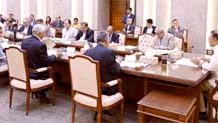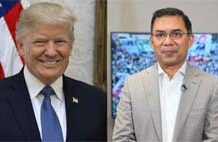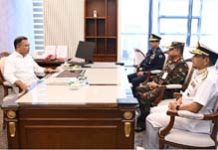C T Online Desk: State Minister for Foreign Affairs Md Shahriar Alam has said Bangladesh’s Indo-Pacific outlook is not to choose between major powers.
“Our outlook focuses on multilateralism and the centrality of the blue sphere. Our focus is not security-centric, rather we focus on inclusive development of this region,” the state minister said at a seminar titled “Bangladesh’s Indo-Pacific Outlook: Opportunities and Way Forward” on Saturday.
The Bangladesh Institute of International and Strategic Studies (BIISS) and the Bangladesh Foundation for Regional Studies organized the seminar at the BIISS auditorium in Dhaka.
Foreign Secretary Masud Bin Momen presented the keynote speech and said Bangladesh’s policy drew appreciation from all.
Friendship to all
The post-WWII world order is increasingly being reshaped with the rise of countries in the Indo-Pacific region, resulting in a global realignment of strategic postures.
As a demonstration of the world’s renewed interest in the Indo-Pacific region, various Indo-Pacific strategies, visions, outlooks and guidelines have been introduced and advocated by countries or associations like the US, EU, UK, France, Germany, the Netherlands, India, Asean, Australia, Republic of Korea, Canada, Czech Republic and Bangladesh at different points in time.
Asia Rebalancing Strategy, Belt and Road Initiative (BRI), Free and Open Indo-Pacific (FOIP), Quadrilateral Security Dialogue (QUAD), Trilateral Security Pact (AUKUS), Indo-Pacific Tilt, Security and Growth for All in the Region (SAGAR), and Indo-Pacific Economic Forum for Prosperity (IPEF) have been adopted by countries centring on the Indo-Pacific region to address new security challenges as well as infrastructure, economic and technological developments in this region.
“As a littoral state of the Bay of Bengal, Bangladesh’s appreciation of the Indo-Pacific narratives is based on its foreign policy dictum, “friendship towards all, malice towards none,” set forward by Bangabandhu Sheikh Mujibur Rahman,” the state minister said.
He continued: “A free, open, peaceful, secure and inclusive Indo-Pacific is essential for peace, security, stability and growth in the region and beyond.
“It is not about critical choices between the major powers. It aims at promoting fundamental principles such as the rule of law, freedom of navigation, inclusiveness, shared prosperity, etc. We support making and clarifying claims based on international law, not allowing the use of force or coercion and seeking to settle disputes by peaceful and diplomatic means.
“We believe in strengthening regional connectivity via quality infrastructure, people-to-people exchanges and institutional harmonization.
“We want to be assured of peace, prosperity and stability in the region by focusing efforts on capacity building as well as humanitarian and disaster relief operations.”
Militarization of the peaceful sea lane was not in the interest of anyone, the state minister said.
“We wish to establish broader and deeper ties with major powers and other regional countries as today’s security challenges are more directly related to cross-regional and global issues such as prevention of the spread of international terrorism as well as maritime security.
“Bangladesh believes that cooperation and collaboration among the countries of the Indo-Pacific region are essential for the shared prosperity of all.
“Therefore, our Indo-Pacific outlook is an attempt to tell the world that the region is for our common prosperity, not just for those who live in it, but also for the whole world,” said the state minister.
Bangladesh on right track
Bangladesh announced its own Indo-Pacific outlook (IPO) in April just before Prime Minister Sheikh Hasina’s visit to Japan, a key ally of the United States.
“Since its launch in April, Bangladesh’s IPO has generated considerable interest at home and abroad,” Foreign Secretary Momen said in his keynote speech.
“It reinforced our conviction that this had indeed been a right move to make,” he said, adding that the IPO had so far “elicited positive responses from all our major international partners for its thrust on ‘shared prosperity for all.’”
He clarified the focus further on five issues.
“First, at its core, Bangladesh’s IPO is centred on our vision for a free, open, peaceful, secure and inclusive Indo-Pacific – a ‘catch-all’ formulation our Prime Minister Sheikh Hasina first used in an official communication in 2018.”
This broad vision was very much aligned with Bangladesh’s time-tested foreign policy dictum – friendship to all, malice towards none, he said.
“We consider our IPO to be firmly anchored in this legacy, and thus a reflection of our abiding commitment to an inclusive, democratic, rights-based and rules-based international order serving our national interest.
“Second, as its name implies, the IPO is indeed focused on the geographic location that surrounds the meeting point of the Indian and Pacific Oceans.
“We have consciously avoided defining the perimeters of the Indo-Pacific in order to signal our readiness to engage with all actors that have launched their respective Indo-Pacific strategies with their own preferred delineations.
“What we find common to all Indo-Pacific strategies is their incorporation of the Bay of Bengal and its littoral states, including Bangladesh.
“We realize that thanks to our geo-strategic location, Bangladesh holds varying degrees of relevance for different Indo-Pacific strategies – a fact that we need to espouse to our own advantage,” the foreign secretary said.
“In our conception of the Indo-Pacific, therefore, there is a combination of both terrestrial and maritime areas despite the apparent emphasis on oceans and seas in the notion of Indo-Pacific itself. There cannot be any scope for assuming that our IPO takes a sea-bound focus at the exclusion of the land mass constituting the broader perimeters of the Indo-Pacific.”
The secretary went on: “Third, this brings us to the crux of the IPO with its obvious accent on inclusivity as a non-negotiable element for Bangladesh.
“Bangladesh cannot afford to pursue a divisive or exclusionary approach to Indo-Pacific as we strive towards collective resilience and prosperity in tandem with our own development trajectory. The fact that Bangladesh launched an IPO in the same year as signalling its interest in enhanced engagement with BRICS is perhaps reflective of our conscious choice to associate with multiple configurations in a multi-polar world.
“Fourth, the thrust on inclusivity necessitates that we cooperate with our interested Indo-Pacific partners on wide-ranging issues concerning development and security.
“Like all Indo-Pacific partners, Bangladesh faces a number of non-traditional security threats that can be a serious detriment to our economic growth and development aspirations unless we tackle them through effective regional and international collaboration. Here, we would like to stress that security or defence cooperation does not necessarily entail joining any military bloc or alliance per se.”
“Fifth, on the question of rolling out or implementing the IPO, we consider it to be subsumed under our multi-dimensional foreign policy initiatives on all the individual issues we have identified in the document,” he said.
In the critical area of connectivity, the foreign secretary said, Bangladesh remained committed and active on multiple fronts, including through regional or sub-regional configurations like Saarc, Bimstec and BBIN.
Connectivity hub
Sheikh Hasina during her Japan visit in April reaffirmed support to Prime Minister Fumio Kishida’s elaboration of the Bay of Bengal Industrial Growth Belt or BIG-B surrounding Bangladesh and the contiguous parts of Northeastern India.
Focusing on that area, the work on the Matarbari deep-sea port, as well as the expansion of Chittagong port, was underway, while new avenues were opening up in the road and rail connectivity with Northeastern India, Foreign Secretary Momen said.
“Bangladesh’s connectivity initiatives along the other sides of its borders with India are also witnessing diverse forms of investment, including the inauguration of a diesel pipeline across the northern part this year.
“We believe bilateral connectivity projects will feature prominently during our prime minister’s upcoming meeting with Prime Minister Narendra Modi in New Delhi on the sidelines of the G20 Summit.
“In July, our Prime Minister exchanged views with her Nepalese counterpart, Pushpa Kamal Dahal, about the possibility of further opening up trade and energy corridors. We are also a part of the Belt and Road Initiative or BRI. Meanwhile, Bangladesh remains engaged in discussions with UN-ESCAP and Asian Development Bank on multiple connectivity corridors across the region and also with the EU and European Investment Bank on viable cross-border connectivity projects under the Global Gateway Initiative.”
Looking ahead, the foreign secretary said, Bangladesh would continue to “give priority to regional connectivity in pursuance of our political leadership’s vision to position our territory as a connectivity hub in the Indo-Pacific context.”
















